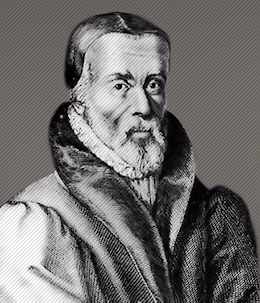Textus Receptus Bibles
William Tyndale Bible 1534
New Testament
| 3:1 | What preferment then hath the Iewe? other what a vauntageth circumcision? |
| 3:2 | Surely very moche. Fyrst vnto them was committed the worde of God |
| 3:3 | What then though some of them did not beleve? shall their vnbeleve make the promes of god with out effecte? |
| 3:4 | God forbid. Let god be true and all men lyars as it is written: That thou myghtest be iustifyed in thy sayinge and shuldest overcome when thou arte iudged. |
| 3:5 | Yf oure vnrightewesnes make the rightewesnes of God more excellent: what shall we saye? Is God vnrighteous which taketh vengeauce? I speake after the maner of me. |
| 3:6 | God forbid. For how then shall God iudge the worlde? |
| 3:7 | Yf the veritie of God appere moare excellent thorow my lye vnto his prayse why am I hence forth iudged as a synner? |
| 3:8 | and saye not rather (as men evyll speake of vs and as some affirme that we saye) let vs do evyll that good maye come therof. Whose damnacion is iuste. |
| 3:9 | What saye we then? Are we better then they? No in no wyse. For we have all ready proved how that both Iewes and Gentils are all vnder synne |
| 3:10 | as it is writte: There is none righteous no not one: |
| 3:11 | There is none that vnderstondith there is none yt seketh after God |
| 3:12 | they are all gone out of ye waye they are all made vnprofytable ther is none that doeth good no not one. |
| 3:13 | Their throte is an open sepulchre with their tounges they have disceaved: the poyson of Aspes is vnder their lippes. |
| 3:14 | Whose mouthes are full of coursynge and bitternes. |
| 3:15 | Their fete are swyfte to sheed bloud. |
| 3:16 | Destruccion and wretchednes are in their wayes. |
| 3:17 | And the waye of peace they have not knowen. |
| 3:18 | There is no feare of God before their eyes. |
| 3:19 | Ye and we knowe that whatsoever ye lawe sayth he sayth it to them which are vnder the lawe. That all mouthes maye be stopped and all the worlde be subdued to god |
| 3:20 | because that by ye dedes of the lawe shall no flesshe be iustified in the sight of God. For by the lawe commeth the knowledge of synne. |
| 3:21 | Now verely is ye rigtewesnes that cometh of God declared without the fulfillinge of ye lawe havinge witnes yet of ye lawe and of the Prophetes. |
| 3:22 | The rightewesnes no dout which is good before God cometh by ye fayth of Iesus Christ vnto all and vpon all that beleve.Ther is no differece: |
| 3:23 | ¶ For there is no difference, for all have synned and lacke the prayse yt is of valoure before God: |
| 3:24 | but are iustified frely by his grace through the redemcion that is in Christ Iesu |
| 3:25 | whom God hath made a seate of mercy thorow faith in his bloud to shewe ye rightewesnes which before him is of valoure in yt he forgeveth ye synnes yt are passed which God dyd suffre |
| 3:26 | to shewe at this tyme ye rightewesnes yt is alowed of him yt he myght be couted iuste and a iustifiar of him which belevith on Iesus. |
| 3:27 | Where is then thy reioysinge? It is excluded. By what lawe? by ye lawe of workes? Naye: but by the lawe of fayth. |
| 3:28 | For we suppose that a man is iustified by fayth without the dedes of ye lawe. |
| 3:29 | Is he the God of the Iewes only? Is he not also the God of the Gentyls? Yes eve of the Gentyles also. |
| 3:30 | For it is God only which iustifieth circumcision which is of fayth and vncircumcision thorow fayth. |
| 3:31 | Do we then destroye the lawe thorow fayth? God forbid. But we rather mayntayne the lawe. |

William Tyndale Bible 1534
William Tyndale was the first man to ever print the New Testament in the English language. Tyndale also went on to be the first to translate much of the Old Testament from the original Hebrew into English, but he was executed in 1536 for the "crime" of printing the scriptures in English before he could personally complete the printing of an entire Bible. His friends Myles Coverdale, and John [Thomas Matthew] Rogers, managed to evade arrest and publish entire Bibles in the English language for the first time, and within one year of Tyndale's death. These Bibles were primarily the work of William Tyndale.